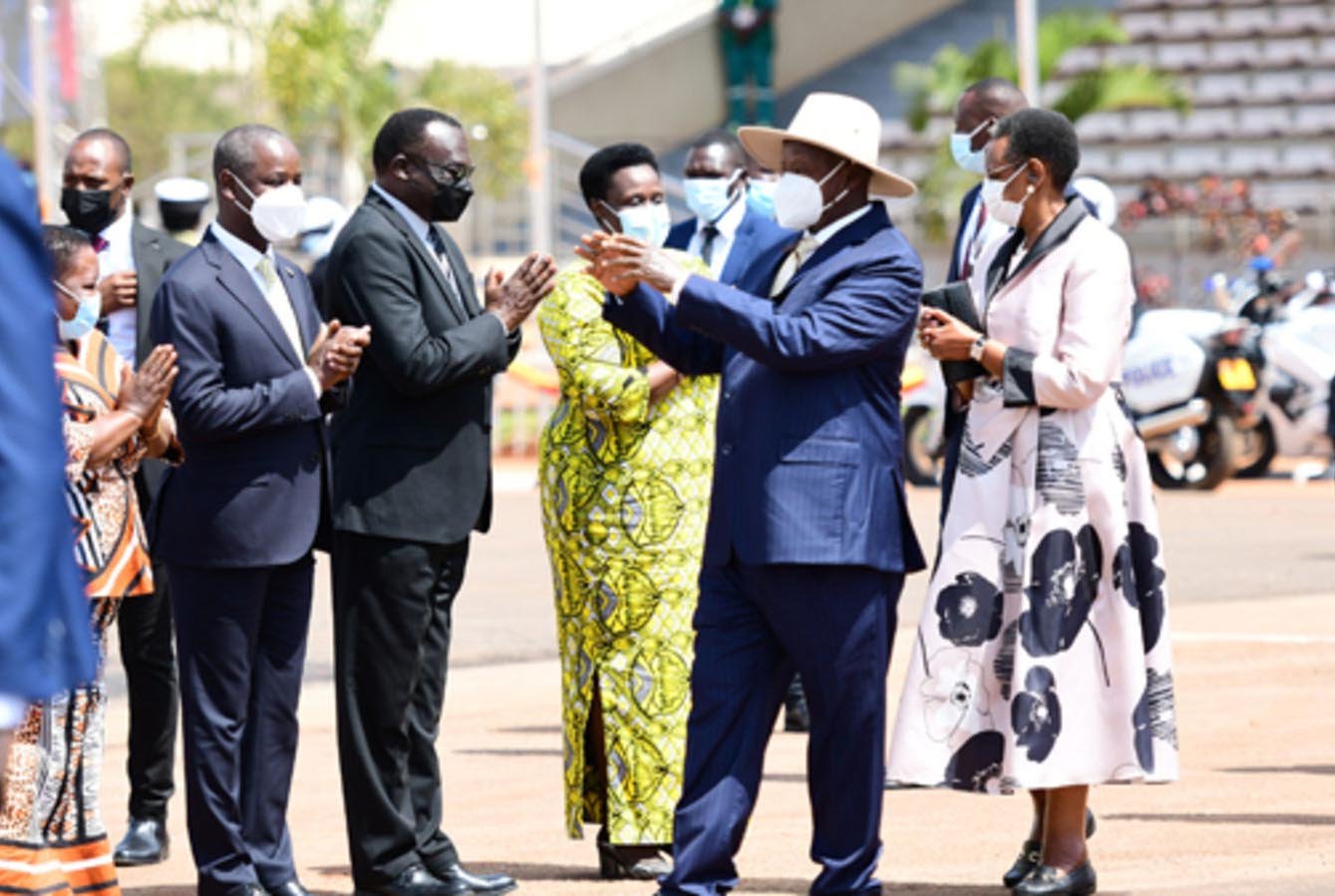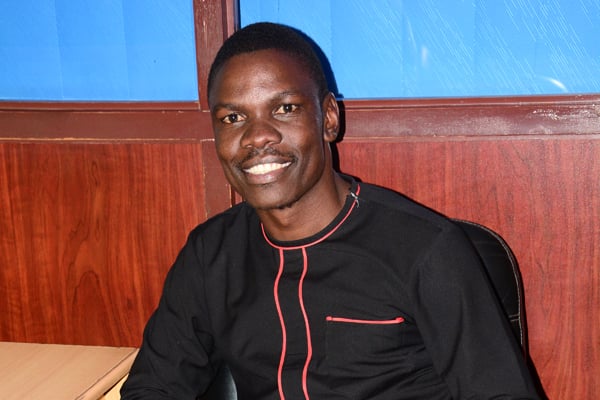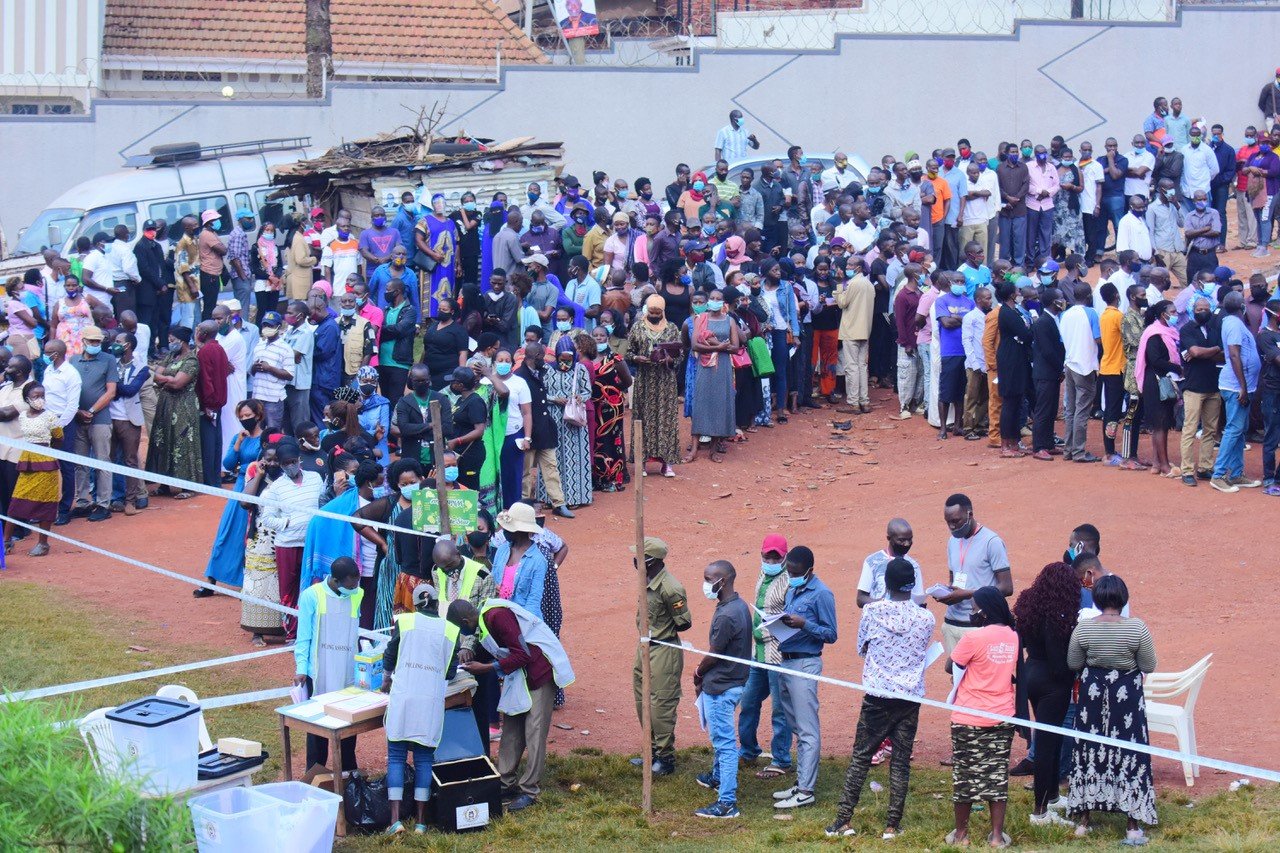Prime
First Lady tasks to VP, premier spark queries

President Museveni, in the company of First Lady Janet, is received by (right to left) Vice President Jessica Alupo, Chief Justice Alfonse Owinyi-Dollo, Deputy Speaker of Parliament Thomas Tayebwa, and Prime Minister Robinah Nabbanja during the 60th Independence Day celebrations at Kololo Ceremonial Grounds on October 9. PHOTO/FILE
What you need to know:
- Neither Uganda’s Constitution nor any other law of the land provides for the Office of the First Lady, which is an influential but non-executive duty in other jurisdictions such as the United States.
Public disclosures by top political executives that the First Lady delegated them, at the tax payers’ cost, to represent her abroad have sparked questions about her legal authority to do so and role in state affairs.
Vice President Jessica Alupo, who under Uganda’s Constitution is the second-highest ranked citizen, in July and August this year said she had been assigned by Ms Janet Kataha Museveni to represent her at an in-country public function and again in Israel.
“Today, I represented Mama Janet Museveni at the launch of the Anti-Corruption campaign for the year 2022/23. With various representatives of MDAs (ministries, departments and agencies), inter-denominational religious, political leaders and the media, we sought and re-committed the fight against corruption to the Lord,” a July 29 tweet on the VP’s official handle, @jessica_alupo, read.
A month later, on August 28, the VP was on a plane, flying to Tel Aviv to represent the First Lady, who doubles as Uganda’s Education minister, at a graduation ceremony of Ugandan students.
Her spokesperson Pamela Ankunda in a tweet on the same day noted that Alupo, a retired major of Uganda’s military, also conducted “other assignments”, which remained unspecified.
It was unclear if Ms Kataha in deputing Alupo to Israel for a graduation ceremony was acting in her capacity as Education minister or First Lady, a reverential title for the spouse of an incumbent president.
Hierarchy
A delegation in a ministerial capacity would upend hierarchy as a Cabinet minister, in this case Ms Kataha, is nine levels lower than a Vice President in the National Order of Precedence in Uganda.
As VP, Alupo is only eclipsed by President Museveni, who in his official capacity takes precedence over all Ugandans and in whom the country’s supreme law vests the exercise of all executive authority.
He also has authority to tap anyone as an emissary at home or abroad in the execution of state duties.
Neither Uganda’s Constitution nor any other law of the land provides for the Office of the First Lady, which is an influential but non-executive duty in other jurisdictions such as the United States, and constitutional lawyer Peter Walubiri said this is the case because no law requires a head of state to be married.
“He (a president) can be a bachelor, or divorcee. We are not a monarchy where the king has to have a consort who has a public function. In a republic, we do not have that kind of thing,” he said.
Despite such interpretation, the First Lady’s exercise of state authority outside her Education ministry docket has widened and manifested, among other things, in her assignment of tasks to Prime Minister Robinah Nabbanja, who heads all ministers and coordinates government activities across ministries.
She ranks number eight on the National Order of Precedence, two tiers above a Cabinet minister that Ms Kataha is.
“I have arrived in Tokyo, Japan, for a four-day working visit, where I am representing the First Lady Mama Janet Kataaha Museveni at the Asia-Pacific and African Women Economic Summit for First Ladies from those countries,” the premier tweeted on November 27.
ALSO READ: Why it is not just about President Museveni
This attracted vitriol on the thread, with one netizen in regard to the assignment noting that “you’ve bastardised our country” while another described the nature of exercise of authority as “totally upside down!”
The attacks prompted a Nabbanja rebuttal. “The First Lady position is enjoined to the President. Because of the unique nature of her position she can actually delegate anybody in government with the exception of the President,” she noted.
Relationship
Mr Julius Mucunguzi, the spokesperson and communications advisor at the Office of the Prime Minister (OPM), towed a similar line in an interview for this article, emphasising that Ms Kataha was acting in her capacity as Uganda’s First Lady in delegating the premier.
A First Lady, he argued, is senior to a minister due to her relationship to the President, the appointing authority of a minister.
The President of the Republic of Uganda is established under Chapter Seven of the Constitution on The Executive, and Article 98(1) makes the office holder the head of state and government, commander-in-chief of the Uganda Peoples’ Defence Forces and fountain of honour.
Similarly, the supreme law in Article 108 provides for the Vice President as deputy to the President and caretaker when the President is unable to perform functions of the office, while the Prime Minister is provided for in the National Order of Precedence as well as the Emoluments and Benefits of the President, Vice President and Prime Minister Act, 2010.
Nothing is stated in law about the First Lady, or representative office, leading lawyer Walubiri to argue that “it is not a public office”.
“It is a private matter between the president and his family. Because there is no official role of the president’s wife in public affairs. It is wrong in protocol [for her to delegate top government leaders]. It is an insult to delegate your senior,” he said.
We reached out to State House for an explanation on the basis of the First Lady delegating top government officials, and why she does not assign personnel in her own office to represent her whether locally or out of the country.
Deputy Presidential Press Secretary, Mr Faruk Kirunda, referred our inquiries to Ms Prossy Basangwa, whom he identified as media aide to the First Lady.
Ms Basangwa in turn sent us to Ms Irene Kauma Tewungwa, the principal private secretary to the First Lady, who bounced us to Mr Baker Waiswa, the First Lady’s executive assistant.
Our attempts to reach Mr Waiswa were futile by press time.
Attorney General’s take
In an interview for this article, Attorney General (AG) Kiryowa Kiwanuka, the principal legal government advisor, said the First Lady takes precedence in hierarchy only in the presence of the President and argued that there is nothing wrong with someone in an unofficial position delegating senior government officers in their official capacity.
“It is not written anywhere in the law that a junior cannot delegate to a senior. I don’t know what yardstick you are using to measure seniority. Let’s not mix matters of mannerism and the law, but in this case, don’t ask me what is bad or good manners,” he said.
The AG added, “I have heard this matter, but I don’t know what is wrong with it because some junior ministers have delegated their seniors. What is wrong with that? Let us not take this matter too far, it is small.”
We reached out to former Prime Minister Ruhakana Rugunda to find out whether he or any Cabinet minister was delegated during his tenure to represent the First Lady as is the circumstances with his successor, and his view about the practice.
“It is not something I saw, but I refer you to the Foreign Affairs minister [that is in-charge of protocol in the country]. I hope you do better research because the question you have posed is very fundamental,” he said by telephone.
Neither the Foreign Affairs Minister Gen Jeje Odongo nor his juniors were available to comment on the matter that individuals we approached balked to discuss.
“Please, leave me out of this one, it is a very sensitive matter and I cannot respond to it,” one of the government officials said when contacted.
A university law lecturer, when asked about the legality of the First Lady’s action in the context of running of state affairs, retorted: “Elizabeth, leave me. Leave me. Leave me. Maybe someone else can speak to that.”
A moral question
Mr Bernard Oundo, the president of Uganda Law Society, said the delegation of senior officials by the First Lady is not a matter of law.
“There is no legal requirement on delegation. There is no law that says the Office of the First Lady will delegate this way. Some things are just moral questions,” he said.
Before joining politics in 2011 both as a minister for Karamoja Affairs and Member of Parliament representing Ruhaama constituency in Ntungamo District, Ms Kataha elevated the profile of the First Lady for her passion in advancing health, youth, women and socio-economic causes.
For instance, based on her own experience of living as a refugee in Sweden when her husband led a successful guerrilla war in Uganda, capturing state power in 1986, Ms Kataha returned in the same year and founded the Uganda Women’s Effort to Save Orphans (Uweso), a frontline non-governmental organisation to support families ravaged by HIV/Aids alongside refugees.
ALSOREAD: The evolution of Uganda’s Constitutions
The First Lady was popular that her characteristic haircut, a trim of the natural hair on the sides with an elevated front, became dominant on female stylists.
She has also intervened to lift rural women out of poverty through another NGO she founded, the National Strategy for the Advancement of Rural Women in Uganda (NSARWU), according to information of her website.
The First Lady who identifies herself on the website as a “professed and active Christian” is a member of OAFLA, an Africa-wide association of first ladies in the anti-HIV/Aids fight.
About a First Lady
Unpaid and unelected, a First Lady’s prominence provides her a platform from which to influence behaviour and opinion, and first ladies have been popular in the United States where they have served as models for how American women should dress, speak, and cut their hair.
Some first ladies have used their influence to affect legislation on important matters such as temperance reform, housing improvement, and women’s rights. Masterclass Articles define the First Lady as a ceremonial title bestowed on the hostess of the White House, most commonly the wife of the sitting president. Her tenure as First Lady is tied to that of the president.




